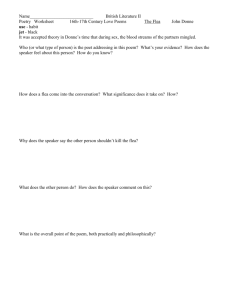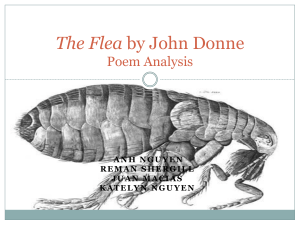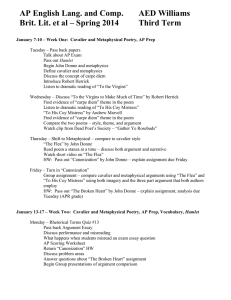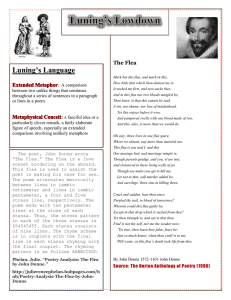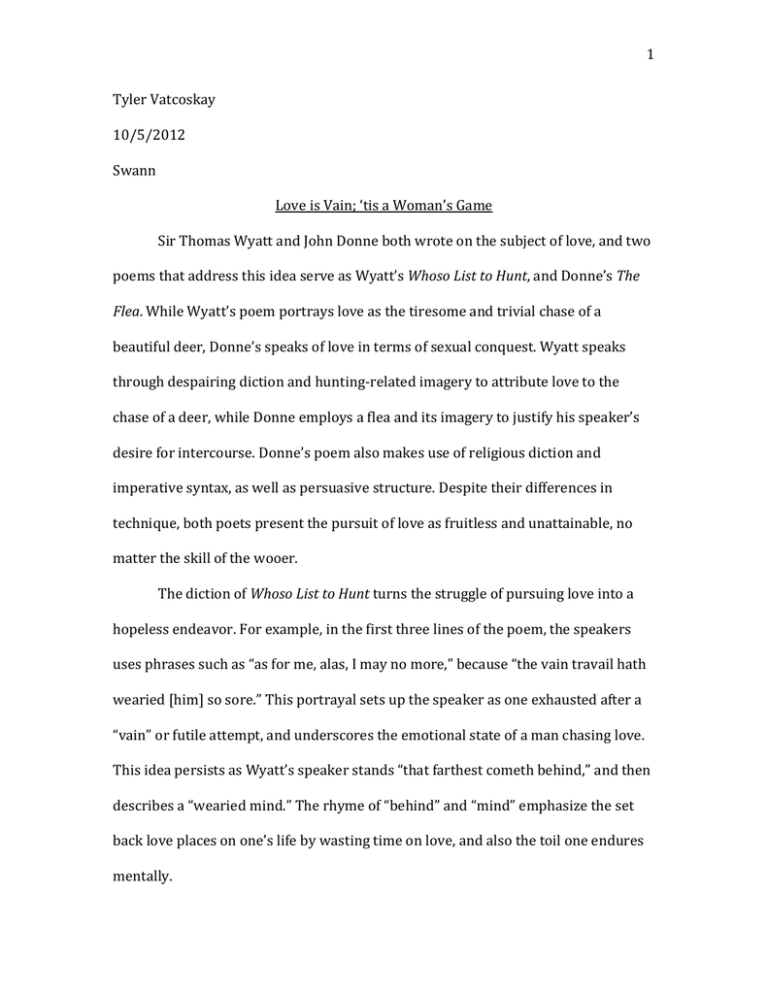
1
Tyler Vatcoskay
10/5/2012
Swann
Love is Vain; ‘tis a Woman’s Game
Sir Thomas Wyatt and John Donne both wrote on the subject of love, and two
poems that address this idea serve as Wyatt’s Whoso List to Hunt, and Donne’s The
Flea. While Wyatt’s poem portrays love as the tiresome and trivial chase of a
beautiful deer, Donne’s speaks of love in terms of sexual conquest. Wyatt speaks
through despairing diction and hunting-related imagery to attribute love to the
chase of a deer, while Donne employs a flea and its imagery to justify his speaker’s
desire for intercourse. Donne’s poem also makes use of religious diction and
imperative syntax, as well as persuasive structure. Despite their differences in
technique, both poets present the pursuit of love as fruitless and unattainable, no
matter the skill of the wooer.
The diction of Whoso List to Hunt turns the struggle of pursuing love into a
hopeless endeavor. For example, in the first three lines of the poem, the speakers
uses phrases such as “as for me, alas, I may no more,” because “the vain travail hath
wearied [him] so sore.” This portrayal sets up the speaker as one exhausted after a
“vain” or futile attempt, and underscores the emotional state of a man chasing love.
This idea persists as Wyatt’s speaker stands “that farthest cometh behind,” and then
describes a “wearied mind.” The rhyme of “behind” and “mind” emphasize the set
back love places on one’s life by wasting time on love, and also the toil one endures
mentally.
2
However, as Wyatt describes this debilitating effect a quest for love results
in, he also supplies the quest with an ensnaring element. For instance, though weak
and failing, the speaker says “fainting [he] follow[s]” while “seek[ing] to hold the
wind.” As before, Wyatt continues to highlight the pointlessness of seeking love, and
furthermore suggests that love unpleasantly binds one to a losing game. The poem’s
speaker follows that idea, and repeats an idea previously mentioned, saying these
hunters “may spend [their] time in vain.” This repetition significantly accentuates
the otiose attitude Wyatt expresses toward a man’s hunt for his heart’s desire, and
forces readers to internalize the worthlessness of working for love.
In addition to establishing love as unworthy of the effort, Wyatt identifies the
reason his speaker’s love lies out of reach. For example, he describes the deer’s neck
as “graven with diamonds” that read “Noli me tangere, for Caesar’s I am.” This
reference brings Henry VIII into the poem through the Christ affiliated diction,
because of Henry’s break from Rome, and the following declaration of himself as the
Head of a new Protestant Church. The aforementioned Latin phrase translates as
“Touch me not,” and this allusion to the Roman Emperor’s deer serves to illustrate
how the speaker’s love really belongs to Henry VIII, the King of England. Henry VIII
proved fond of cutting off heads, and here Wyatt shows us that his speaker, though a
good hunter, turns out a better thinker. The speaker realizes that not only would
pursuing this deer result in the possession of nothing, but also cause the
consequence of literally losing his own head.
Through these examples, Wyatt establishes his perceived structure of a
relationship, where love exists as the goal, yet cannot be obtained. The deer,
3
perceptually the most noble of forest creatures, metaphorically represents a
woman. This proves observable through Wyatt’s gender reference to “her fair neck”
and the hunter becomes a man when Wyatt “put[s] him out of doubt.” So the
portrayal of a relationship sets up man as the pursuer, the one who must make
action, and turns the female into a prize to be preyed upon, subjective to advances
from multiple men, and eventually the property of men. It also implies that a woman
possesses a level of intelligence comparable to a deer. This idea of a relationship
relates directly to Donne’s portrayal of a relationship, for The Flea revolves around a
character that interestingly, like a flea, hops around with various arguments hoping
to take a bite from his prey.
Donne’s speaker shares the same characteristic quality of Wyatt’s, that being
the persistence of actively pursuing a love though getting nowhere. However, the
speaker in The Flea desires a sexual end to his means, and relentlessly delivers
demanding pleas for his chance to achieve that. For example, the poem starts with
an imperative statement, commanding the subject to “Mark but this flea, and mark
in this, how little that which thou deniest me is.” This serves as the first part of the
speaker’s argument, and he expresses how “in this flea, our two bloods mingled be.”
This portrays an early take on sexual intercourse, where people of Donne’s time
believed that blood mingled during sexual intercourse, and his argument cleverly
claims that since the flea already consumed the blood of them both, its like they had
sex without actually having sex. He then employs the religious diction, stating the
act shows no “sin, nor shame nor loss of maidenhead.” To follow this part, he throws
the icing on the cake, pointing out how the flea “swells with one blood made of two,
4
and this, alas, is more than we would do.” Donne places the double entendre on
swells to persuade the woman that the flea appears pregnant, and that fate would
not happen to her.
This first stanza establishes Donne’s viewpoint on love in terms of sexuality,
and sets up the confident and persuasive nature of his character’s speech. The
sexual diction frames the act of having sex as that of little importance, as if the act
exists meaningless. This parallels Wyatt’s speaker’s actions in Whoso List to Hunt, in
such as that both efforts work toward something worthy of no merit. Interestingly,
Donne’s speaker heads toward the same fate as Wyatt’s in the following stanza. For
example, he begins again with a command, demanding her to “stay, three lives in
one flea spare.” This example emphasizes the combination of blood Donne plays off
of, and he seeks to invoke a sense of empathy within the speaker. This also gives him
a basis to delve into religious diction, and make the matter into a holy ordeal. For
example, he follows the first line with “this flea is you and I, and this Our marriage
bed, and marriage temple is” and he claims “[they]’are met, And cloistered in these
living walls of jet.” The term cloistered comes from a monastery, and means
sheltered or kept from the outside world. So this description ties the flea’s
consummation of their blood to the Holy Trinity, as well as transforms the flea into a
sacred relic.
By doing thus, Donne connects the act of sexual intercourse to that of
preserving religion, and furthers that with his speaker stating, “let not to that, self
murder added be, And sacrilege, three sins in killing three.” This religious diction
takes the speaker’s original intention of scoring and justifies its sense of morality,
5
implying that the mixture of their blood in the “living walls of jet” deserves
preservation, and to kill the flea, or to not have sex, would constitute blasphemy. In
a way, the flea and the deer share a common trait, that being the element of both of
them being noble creatures of the story, and illustrating the living representation of
the speaker’s desires. However, Donne’s flea differs from Wyatt’s deer as it ends up
meeting its death via the hand of the woman, yet this idea also parallels the death
Wyatt’s speaker would face if he pursued the deer.
Keeping up with the unyielding chase for the heart’s desire, Donne’s speaker
makes one last appeal. As a last resort, he states she “purpled thy nail, in blood of
innocence?” This choice of the word “innocence” and the spilling of blood give the
sexual act a sense of facing unjustified murder. However, Donne’s speaker realizes
the contradiction of his previous argument, and fixes it by explaining she “say’st that
thou find’st not thy self, nor me the weaker now.” By calling out the result of her
actions, he enables the act of sense to return to its position as the right choice. His
last enticement happens with a triplet, brilliantly coercive, it reads “tis true, then
learn how false fears be; just so much honor, when thou yield’st to me, will waste, as
this flea’s death took life from thee.” This ending Donne’s steadfast persistence and
eventual agreement with the woman he’s pursuing, saying she’s right, nothing
happened to the flea, so nothing will happen to your honor, so let’s go for it! Yet still,
the ending of the poem explains how love remains out of reach, despite the
elaborate skill or cleverness of the wooer.
This element exists in both relationships set up between the two
poets speakers and their objects of desire. Like Wyatt’s deer, the woman in The Flea
6
allows the relationship to set her up as an object of prey, and an individual to be
outsmarted by a man. Though both men end up failing, and this reveals a similarity
between the poets and their attitudes to the evasive idea of love. The speakers’
predatory efforts prove extreme in nature, and enough to weary the both of them,
yet love escapes their grasp regardless. One difference in the efforts exists as
Donne’s poem suggests the commands fail to coerce in a relationship, while Wyatt’s
exemplifies the ineffectualness of chasing one already commanded. This example
furthers, because both poets categorize the women as property, but interestingly
the poets write of women as a possession impossible for them to procure.
On the other hand, the end result of the two poems brings up a certain power
women hold in regards to a relationship. In Wyatt’s example, one could infer that
the deer may not mind escaping the multitude of predators pursuing her, and that
special treatment from the emperor may allow her to live more simply. This
certainly parallels in Donne’s poem as one picks up on the annoyance the woman
feels, and in fact shows as she decides to kill the flea and also refuses the speaker’s
demands. Perhaps the women decide all along, and since the men desire them the
most, they can act as puppeteers, stringing them up in a spider-like web of emotions
and exhaustion. This idea reverses the role of predator and prey, and since women
have the ability to both deny and provoke, this eliminates the illusion of control men
assert to possess.
In summary, the poets Sir Thomas Wyatt and John Donne both write of love
as an impossible aim, and an arduous game where all effort proves in vain. Through
their use of diction, syntax, and imagery, the poets provide examples of men that
7
suffer the fate of failing to subdue the prey of their desires. Wyatt uses an elaborate
description of deer hunting to illustrate the structure of a relationship between a
man and a woman. Correspondingly, Donne establishes sexual intercourse as the
insignificant bite of a flea that merits the devotion owed to the Divine God. Though
different in the construction of their models, both poet’s main characters unyielding
struggles give rise to the absence of a relationship, and suggest that the women
determine the direction it heads in. Men have tried and tried again to tame, to
bestow the gift of a husband’s name, or fail to provide a waste of shame; silly men,
love’s a woman’s game!

